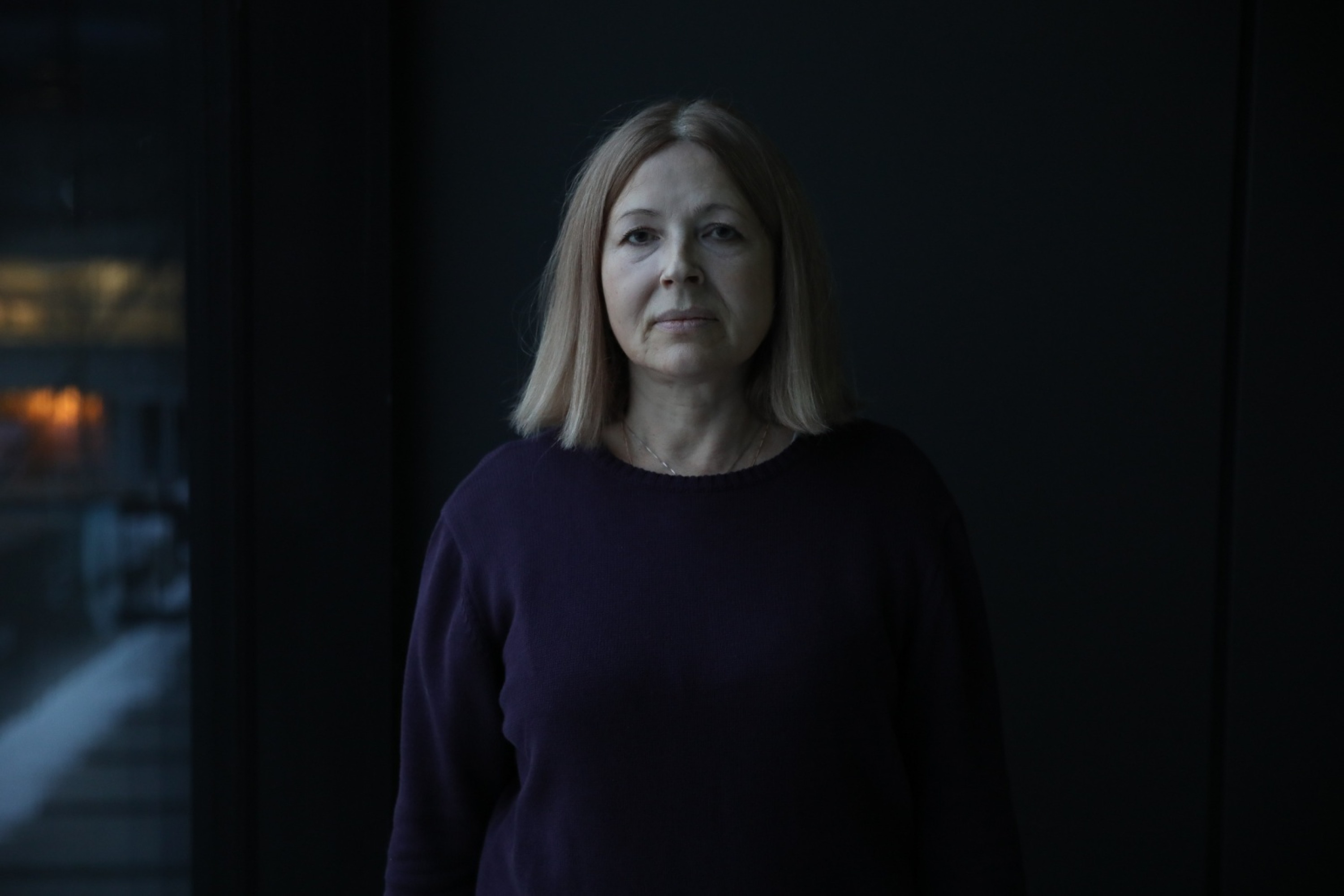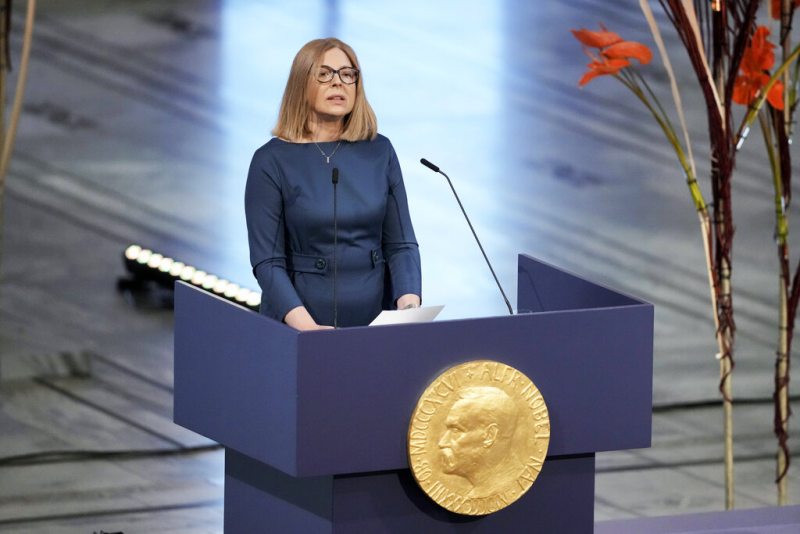Pinchuk: “The painful ordeal fell not only on the human rights defenders, but also on the whole Belarusian people”
On this day two years ago, our colleagues and leaders, Ales Bialiatski, Valiantsin Stefanovic, and Uladzimir Labkovich were arrested. Four months ago, they received lengthy jail terms, up to 10 years, for their human rights activities at Viasna. The three human rights defenders have served serving their terms in the Mahilioŭ district. On the anniversary of the Viasna members' arrest, we spoke with Ales Bialiatski's wife, Natallia Pinchuk, about the latest news from the colony about Bialiatski, the death of his close friend Ales Pushkin, and the continuation of her husband's work.
“It is difficult to say in what state of health our loved ones will be released and whether they will be released at all”

- Natallia Pinchuk. Photo: Halasy
These two years for Ales's family, like for other relatives of political prisoners, have become tough times of trials and new challenges in life. Meanwhile, Natallia recalls her husband's first arrest in 2011, when he was detained and sentenced to four and a half years. He spent almost three years in prison and was released early due to amnesty.
“This term is a new challenge, which can somehow be compared with those years when Ales served his first term in the Babrujsk colony. This time is not easier. Above all, the unknown is difficult to deal with: when there is no communication with him, or it is interrupted, if his letters do not reach me, and vice versa. All this keeps me in great tension. I think this also creates moral problems for Ales.”
Natallia compares the times of the first and the current imprisonment of the human rights defender:
“There are both similarities and differences. We see a big difference in terms. Now Ales was given an enormous sentence, 10 years. It is a sentence for life in the conditions where prisoners are kept in prisons. It is difficult to say in what state of health our loved ones will be released and whether they will be released at all. Another difference from the first term is that the painful ordeal fell not only on the human rights defenders, but also on the whole Belarusian people.. No matter who we ask in Belarus, they will always find someone who has suffered from repression in their close surroundings.”
“In his letters, Ales recalls situations from free life”
In early May 2023, Ales Bialiatski was transferred to the Horki medium-security penal colony No. 9, which is considered, according to former prisoners, one of the most brutal in Belarus:
“After Ales was transferred, there was no news from him for about a month. Then he started sending me letters. As far as I understand, Ales didn't receive my letters to him. Therefore, there are reasons to believe that new psychological pressure is being put on him, breaking the connection with relatives and making his prison stay even more difficult.”
Natallia says that a letter from Ales finally arrived after a month-long break, dated July 3.
"And again, from this letter, I understand that he does not receive my letters. Judging by the letters, Ales's mood cannot be called optimistic, though maybe it's my perception... He tries to convey to me as if everything is fine with him. But I understand how 'normal' it can be under the current conditions of the prisons. And even former prisoners before 2020 testified that the conditions in Colony No. 9 are very harsh. They told how the 'criminal element' is incited against political prisoners, about beatings in the showers... Therefore, I can judge by the testimonies of former Horki colony inmates what the conditions are.
Ales is worried that I would not worry about him. In his letters, he mostly recalls how we lived before and situations from free life. The content of his letters is not wide-ranging.”
The human rights defender works as a handyman at a wood processing site in prison. Natallia notes that Ales doesn't write much about his health in his letters. Still, sometimes it slips through that it's deteriorating.
“And this worries me very much.”
“Ales Pushkin was a bright example for Ales of a true Belarusian and an artist”
On the night of July 11, political prisoner and artist Ales Pushkin, who was serving a five-year term for a painting in a Hrodna prison, passed away. He was a close friend of Ales Bialiatski. Natallia is very concerned about her husband's state when he learns this terrible news:
“I dread to think what Ales will feel when he learns this news. How he will cope... I can't bring myself to write to him about this... For Ales, this will be a devastating blow. I couldn't believe it and refused to believe it, and I still can't come to terms with it.
These are very close people with the same views on life and everything happening around them. They are people who are devoted to Belarus. Ales Pushkin was a bright example for Ales of a true Belarusian and an artist.”
Natallia notes that the death of Ales Pushkin, among other things, demonstrates how political prisoners are treated in prisons:
“Ales Pushkin refused to switch to Russian even under these horrifying imprisonment conditions, for which he also suffered. Unfortunately, persecutions of Belarusians and Belarusian identity continue in our country in such horrific forms. Those who stand for the Belarusian language to the end are, in essence, exterminated.”
“I must do at least what I can, not only for Ales but for everyone”
Natallia shares that a lot of effort is needed for the Belarusian issue to be heard on the international scene and in foreign media pages to be perceived and heard among politicians. And Natallia tries to do this. Thus, in late June, Natallia spoke at the Human Rights Subcommittee of the European Parliament, where she talked about the situation in Belarus, political prisoners, and the conditions in which they are held in detention facilities, and what assistance they need.
"In addition to this terror against the people, a policy of ethnocide is essentially taking place, where the Russian language and narratives are being imposed, and history is being rewritten. Thousands of people are suffering inside and outside Belarus, forced to flee this terror from their country. Lukashenka is leading the country into the ‘Russian world,’ not allowing any live Belarusian activity inside the country. All organizations aimed at developing and reviving the Belarusian language and culture have been closed. This all characterizes the anti-Belarusian policy that Lukashenka carries out in our country. And this, too, is a violation of the rights of Belarusians.”

Natallia Pinchuk in European Parliament: “Belarusian people did not submit. The events of 2020 are not forgotten.”
Natallia explains that for obvious reasons, for international journalists and politicians, the first issue about Belarus is related to Ukraine and the war.
"But we must not forget that Belarus is an integral part of geopolitics that needs to be defended. After all, a democratic Belarus is, in essence, a guarantee of peace for Ukraine and all of Europe. Therefore, Belarus must be kept under scrutiny, and everything possible must be done to reduce the dominance of this dictatorship to nothing.”
Now Natallia is effectively continuing the work of her husband, the founder and chairman of the Human Rights Center "Viasna" and the laureate of the Nobel Peace Prize, Ales Bialiatski, becoming not only his voice but the voice of many Belarusians:
“I believe that I must do at least what I can for Ales and everyone in this terrible situation. This gives me a sense of purpose in my existence because I can do some work for the benefit of our people.”
At the end of the conversation, Natallia notes that democratic transformations and changes in Belarus are one of the most important goals we must achieve.

















